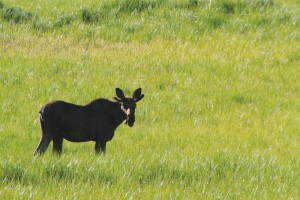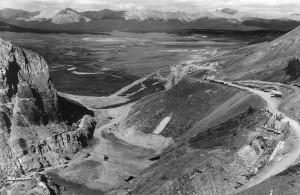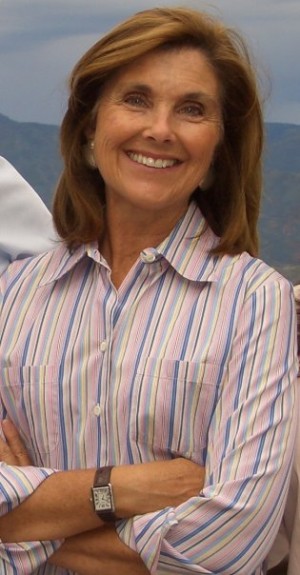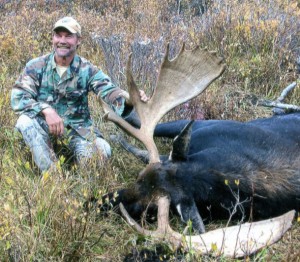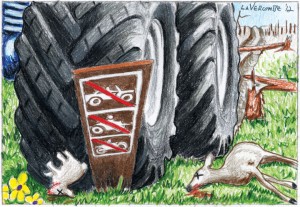By Hal Walter
While driving home through the Wet Mountain Valley after picking up a homeopathic remedy for a sick cow, I detected a quick motion coming from behind and in a field to the right. Before I could even turn my head, the bird – surely a peregrine falcon – was angling across the road in front of me like a rocket, riding the contours with its built-in radar over fencelines and the rolling landscape.
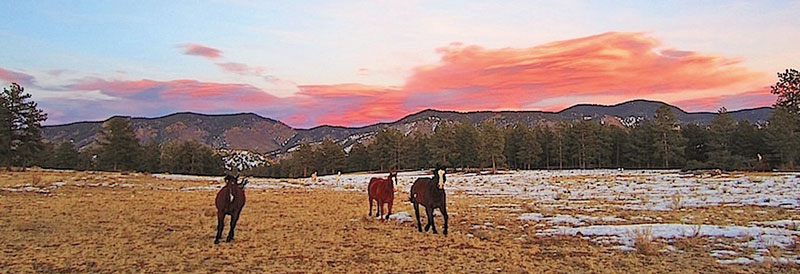
It zoomed – wings-tucked – toward a pond and flew headlong into what it had apparently been zeroing in on all along – a flock of blackbirds. There was a moment of chaos as the blackbirds erupted in all directions. But the falcon apparently came up empty-taloned. I watch as it braked by setting its wings several times, then lighted on a fencepost with a posture that almost exuded embarrassment.
The cow we call Sophie has been sick for nearly six months now. Originally diagnosed as an upper-respiratory infection, we’ve had several vet visits for it. We run a natural beef operation here until something like this happens, and a few rounds of injected and powdered antibiotics might save a cow’s life. However, none of these heavy drugs has made any difference in Sophie’s symptoms.
Most of the diseases cows typically get would have surely dropped her by now. We’ve ruled out just about every condition except for one – an actinobacillus infection. This can be caused by a sticker or piece of woody fiber being caught in the mouth or throat. The common name for the condition is “wooden tongue.” Veterinarians generally treat this with sodium iodide administered by IV. The only problem with this is that the side-effect is abortion, and Sophie is indeed pregnant.
Thus, the homeopathic remedy, and the chance sighting of the zooming falcon.
If someone had told me even 10 years ago that someday I’d be giving a homeopathic remedy to a sick cow it would have seemed a crazy notion that I’d be the caregiver for a cow at all, much less giving her a homeopathy remedy. But these are the experiences I’ve come to expect from a life that takes interesting twists, and especially the job of managing a small ranch over the past seven years.
I first purchased the cows for the ranch back in 2005 from Virgil Lawson, a Wetmore rancher. Old Virgil insisted that I just had to have Sophie as part of the package. She’s a “lead cow” he said, and would keep the herd together. She’s also “bucket-trained” so having her makes it easy to round up the entire herd. Virgil died in 2006, and I have to believe that somewhere he is laughing aloud at the prospect of Sophie still even being with us, not to mention treating her with homeopathics.
So I may feel some attachment to this particular cow. I take a spiritual approach with all the cattle, realizing their path here is part of the food chain, trying to provide them with a good life while they’re here, as peaceful and humane as possible transition when their time comes, and making sure that as little as possible goes to waste. I even had dog food made from bone meal, fat and scraps from the last steer we harvested, and specify that other by-products be donated to the Mission Wolf Sanctuary. I guess I’m probably not the typical “rancher.”
However, it’s been difficult to ever picture Sophie in this food chain. Perhaps her illness is an alternative path. In all likelihood she’ll die on the ranch. If we’re lucky, she’ll have another calf before she moves on.
Though I have more than 30 years experience in “journalism” – whatever that is, or means, in this day and age of declining readership and twitter attention spans – it’s odd that the longest continuous-running job I’ve had in this lifetime has been managing this ranch. The bottom line – except for a very privileged few, writing simply does not pay the bills.
Recently I’ve also become involved with the local “farm-to-table” movement, and in the last year started a publication called Farm Beet (check out www.farmbeet.com). The growing demand for high-end locally produced specialty crops is a quiet revolution taking place all over the country. It’s truly appalling that our food-supply system makes it easier for restaurants, stores and area residents to buy food from as far away as China than to buy from local farmers and ranchers. This system is flawed on many levels and needs to be fixed.
And while that movement has become part of my life process, sometimes I think I need to find a more “sensible” career direction. Move. Get a “real job.” But what would that be, and where? A survey of opportunities for someone with my professional skill-set seems to be limited to technical editing and bizarre marketing projects with businesses that could be gone tomorrow. On a recent day trip to Denver, I found myself looking at the hundreds, maybe thousands, of plate-glass high-rise office buildings, and thought that inside these the countless drones were shuffling papers, feeding the beast. The next day I was purely exhausted. How long would I last in that environment? Not very.
Then one day I was at the ranch waiting for Sophie to eat her homeopathic-treated oats, and waiting for a stock tank to fill, standing on a sunny slope where I have thought several times over the years to be the perfect location for a big greenhouse. Then I visualized a free-range chicken yard. The cow-calf operation would be converted to a yearling grass-finished “microbeef” operation. My mind hit full stride and the guest house was rented, horses were boarded, there was a neighborhood membership fee for the arena, event-hosting, the streambank was planted in watercress and mint and other high-dollar aquatic vegetables. The list goes on …
In one moment of insanity – or was it pure sanity? – I was ready to sink my future into something I truly believe in. In that time I was zooming in on an idea that could end in success or failure. And I wrote something different for a change – a proposal.
It’s said the falcon’s message is one of mental speed and agility, and patience. And it’s clear a falcon places all focus when then opportunity presents itself. The greatest risk is to end up empty-taloned, which is really where you started in the first place.
Hal Walter writes and edits from the Wet Mountains. You can keep up with him regularly at his blog: www.hardscrabbletimes.com


